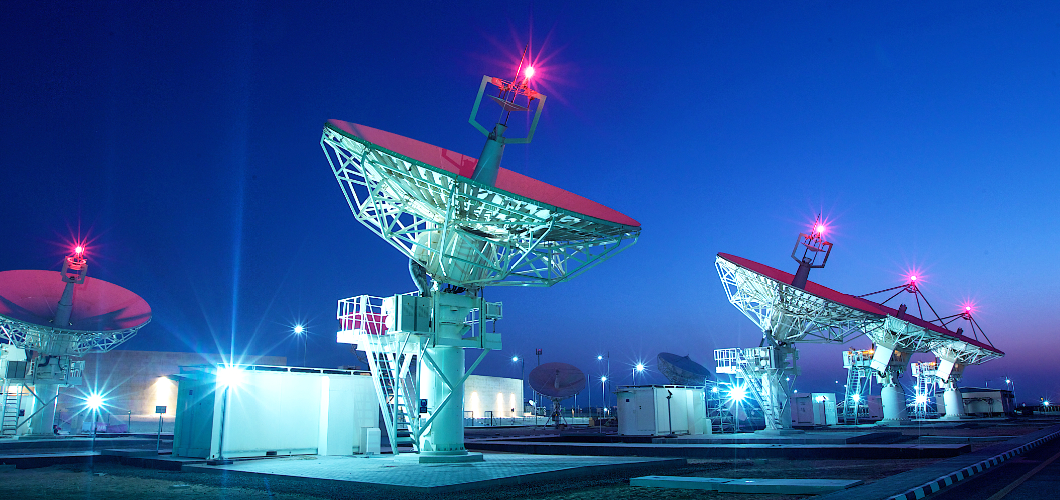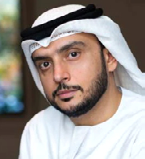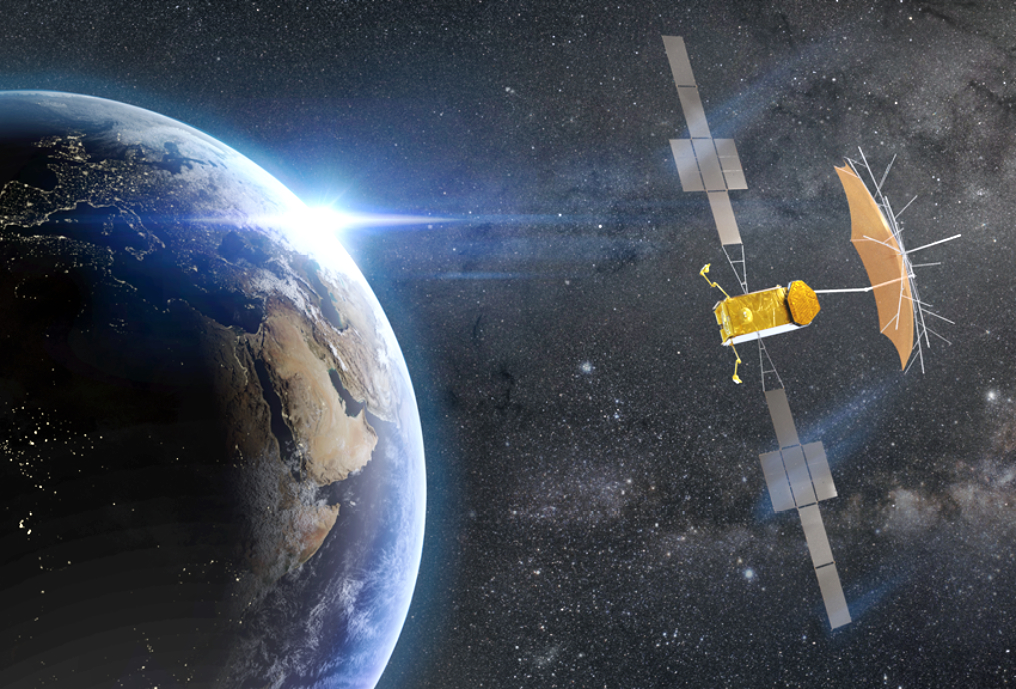Connectivity is one of the fastest growing space industry segments. Satellite- based solutions complete and augment terrestrial networks to provide a global broadband experience for government and private users.

Photo of Yahsat teleport.
Satellites also play an increasingly important role in building a smart, connected world through Internet of Things (IoT ) technology. Satellite communications (SATCOM) support IoT applications in areas where cellular connectivity is not possible, such as the deep sea, remote sites as well as mining locations.
The UAE’s Al Yah Satellite Communications Company PJSC, better known as the Yahsat Group, is exploring potential acquisition opportunities globally in the IoT sector following the firm’s investment in eSAT Global, a US-based, direct-to-satellite, connectivity provider to IoT devices.

Sulaiman Al Ali
Yahsat’s Chief Commercial Officer, Sulaiman Al Ali, confirmed that Yahsat is in talks with start-ups operating in the IoT sector, in-line with the Group’s strategy of prioritizing growth markets.
Investing In eSAT Global
The overall IoT market is projected to grow at a compound annual rate of 22% over the next five years to $525 billion, and the satellite IoT business is forecast to generate a cumulative revenue of $6 billion over that same period of time.
The investment in eSAT Global is the first step toward achieving Yahsat’s IoT long-term strategy, as it is the Group’s key ambition to be a prominent force in the IoT market.
Discussing Yahsat’s plans, Sulaiman Al Ali said, “We are studying the market very actively and leveraging new opportunities that are emerging. We are actively interacting with these companies. Our strategy is there, and we are really studying the market. When the correct opportunity appears, we will be there.”
Currently, the IoT market is dominated by start-ups that are identifying opportunities in the varied segments.
“In terms of market opportunities, segments such as smart agriculture, environmental monitoring, digital maritime and cold-chain tracking, these are just some of the areas that require IoT solutions,” the CCO added.
While eSAT has submitted proofs of concepts, Yahsat — as part of its investment — aims to have commercially viable solutions by the fourth quarter of 2023. This investment offers strong financial returns and the growth outlook is optimistic.
According to Mr. Al Ali, “Some of the solutions will see immediate interest by the market. For instance, the oil and gas segment has a clear need for monitoring and tracking solutions, and so does the agriculture and livestock segment.” He cites Australian farms, as an example, where there is a need to tag cattle and track their location as well as their biometrics.
Yahsat’s investment in eSAT will bring a “new disruptive, low-cost, low latency, direct-to-satellite IoT service to the market”, Yahsat said in a statement to the Abu Dhabi Securities Exchange where the company’s shares are traded .
This will enable Yahsat to expand in the “fast-growing IoT sector that is still significantly underpenetrated and in line with the company’s strategy of prioritizing growth sectors.”
Yahsat’s mobility business, Thuraya, also signed a commercial agreement with eSAT to develop a nexgen IoT platform that will provide customers with IoT portfolio access on a global scale. This agreement will provide Thuraya with secure and long-term access to an end-to-end, low power wide area network (LPWAN) IoT system and portfolio.
Yahsat’s investment in eSAT and Thuraya’s commercial agreement, are aligned with the Group’s belief in the outsized impact of the IoT sector for the satellite and space industry.
Devices equipped with the new eSAT module will be able to communicate with satellites using very low transmit power anywhere within Thuraya’s footprint.
The new platform has been designed with 5G considerations, has ubiquitous coverage and will also integrate capabilities to support low-cost texting services to enable constant connectivity for smartphone users—particularly in emergency situations.
Growing Presence In The Government Sector
In addition to IoT, Yahsat has identified strong market potentials within the government segment that is growing exponentially, both in the UAE and globally, as well as in the maritime segment, where it has already established a presence through its Thuraya MarineStar voice and data solution and high-performing broadband services.

Artistic rendition of the Thuraya-4 satellite on-orbit, courtesy of the company.
The Group is also preparing to launch its sixth satellite — Thuraya 4-NGS (T4-NGS)
— that is scheduled to start commercial services during the second half of 2024. As a nexgen satellite, T4-NGS is expected to bolster Yahsat’s connectivity solutions, as it will offer capabilities never before seen in the mobile satellite industry.
Last year, Yahsat was also appointed by the UAE government to expand the existing fleet with two new satellites, in addition to T4-NGS, which cemented in place the Group’s robust, growth trajectory
Yahsat raised the company’s lower end of projected 2022 revenue by 1.2% at the end of the first half of 2022 to at least $420 million from the earlier guidance of
$415 million, keeping the upper end unchanged at $440 million.
Yahsat’s first-half revenue stood at $206 million, up more than 8% from the same period last year. Net profit attributable to shareholders for the six-month period was $45 million, up more than 50% from the same period in 2021.
“If we think about the company’s journey overall, our business is resilient and we did not feel the effects of worldwide inflation and volatility,” Mr. Al Ali said.
Accelerating UAE’s Growth As A Space Economy
Founded in 2007, Yahsat offers multi-mission satellite services in more than 150 countries across Europe, the Middle East, Africa, South America, Asia and Australasia. The company has a fleet of five satellites that extend its reach to more than 80% of the world’s population.

As a homegrown champion, Yahsat’s goals are closely aligned to the UAE’s national objectives, as the nation continues to achieve impressive milestones in the global space and satellite sector.
Yahsat currently provides the following services through its subsidiaries:
• Fixed Satellite and Mobility Services on sea, land, air platforms
• Specialized services for Government, Military and Defence customers
• Customized solutions for sectors such as Maritime, Energy, Relief, Aviation, IoT and Media Broadcast
In addition, the Group is actively involved in developing national space policies and regulations, managing scientific investigations, research and development (R&D), and national youth empowerment programs that include the mentoring of student-led cubesat missions.
www.yahsat.com

